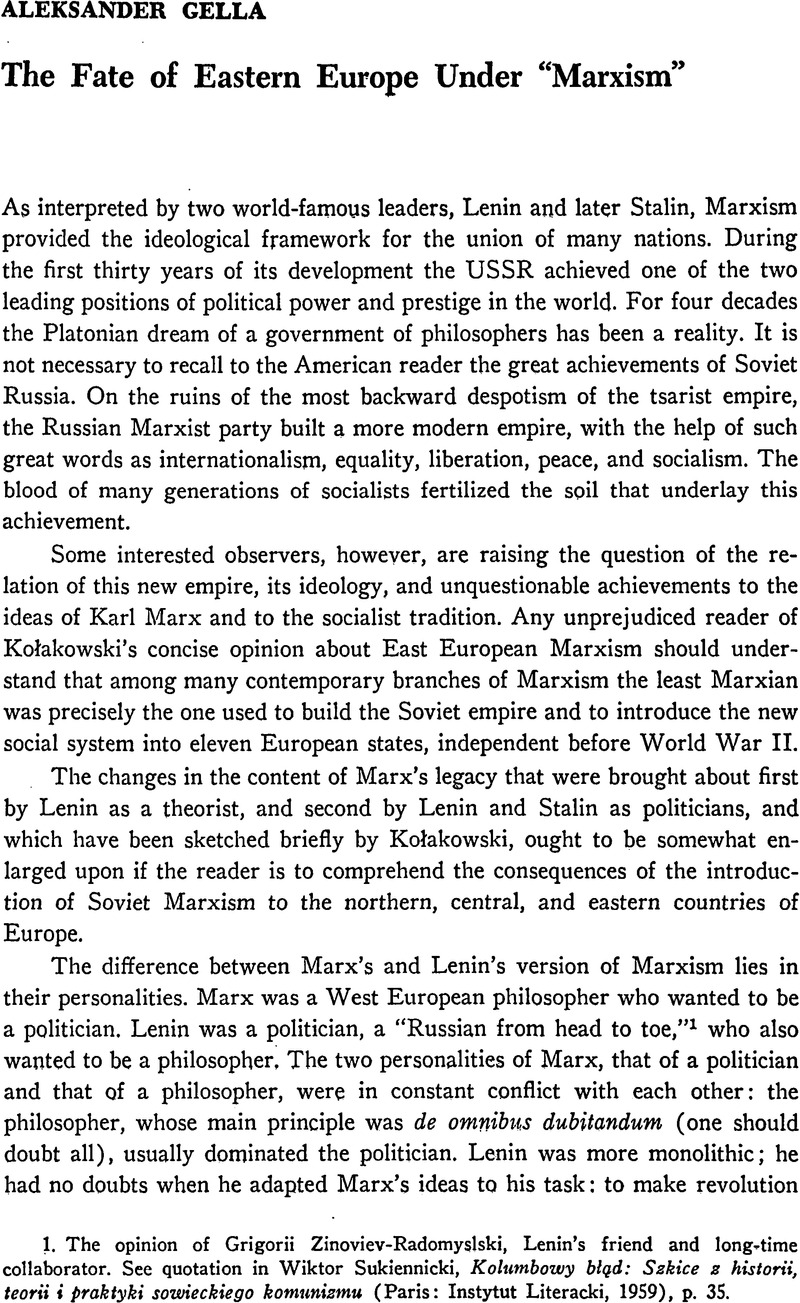No CrossRef data available.
Published online by Cambridge University Press: 27 January 2017

1. The opinion of Grigorii Zinoviev-Radomyslski, Lenin's friend and long-time collaborator. See quotation in Wiktor, Sukiennicki, Kolumbowy blqd : Sskice z historii, teorii i praktyki sowieckiego komunizmu (Paris : Instytut Literacki, 1959, p. 35.Google Scholar
2. Wolfe, Bertram D., An Ideology in Power : Reflections on the Russian Revolution (New York, 1969), p. 164.Google Scholar
3. All attempts to point out the not really serious personal conflicts (which took place toward the end of Lenin's life) between these two creators of Soviet Marxism as evidence of deep political differences between them are childish efforts at covering the historical reality.
4. Columbus's Mistake is the title of the book cited in note 1, by Professor Sukiennicki, a Polish leftist living in exile, who is one of the greatest experts on Soviet history.
5. The new regime organized mass education with special courses called rabochye fakul'tety for those upwardly mobile people who were appointed to take the leading positions in civil administration, the judiciary, education, and industry.
6. A young American sociologist, Mr. D. Roth, called my attention to the interesting fact that in the American sociological vocabulary, as well as in Webster's Dictionary, the term for a process opposite to “secularization” does not exist
7. One of the reasons the concept of “national character” awakens a feeling of repulsion in liberal sociologists is their materialistic and anthropological concept of nation. In fact, however, nation is a spiritual phenomenon, a product of history and common experiences, but not of a race. The results of the Marxist Revolution in Russia were at the very beginning predicted by some intelligent observers on the basis of national characteristics. One of the greatest twentieth-century Polish poets, Julian Tuwin, a party member, predicted what is known today as the period of the “cult of personality” (in his poem “Wielka Teodora, ” which is not well known because it Was never re-edited after 1945).
8. In describing the situation of these countries since 1945, I consciously omit the purely political problems, such as the physical liquidation by arrest, execution, and deportation of the people of the anti-Nazi underground movement in Poland (1944-48), the destruction of all non-Communist parties in other countries, and the changing by force of all traditional institutions, organizations, and forms of political life
9. See Henryk, Skolimowski, Polish Analytical Philosophy (London and New York, 1967).Google Scholar
10. See Henryk, Skolimowski, Polish Marxism (New York : Columbia University Press, in press)Google Scholar or in Polish, Polski Marksizm (London, 1969).
11. Philosophers : Kazimiefz Twardowski, Kazimierz Ajdukiewicz, Tadeusz Kotarbiński, WJadyslaw Tatarkiewicz. Logicians : Jan Lukasiewicz, Stanistaw Leśniewski, Leon Chwistek. Mathematicians : Wactaw Sierpiński, Stefan Banash, Casimir Kuratowski, Hugo Steinhaus, Stanisfaw Saks, Alfred Tarski (also a logician), Stanislaw Zaremba, Stefan Mazurkiewicz, Karol Borsuk, Antoni Zygmund, Marek Kac, Stanisław Ulam
12. Andrzej, Malewski, “Empiryczny Sens teorii materializmu historycznego,” Stadia filozoficzne, 1957, no. 2, pp. 58–81.Google Scholar
13. An excellent presentation of Malewski's criticism is given in Jordan, Z. A., Philosophy and Ideology : The Development of Philosophy ahd Marxism-Leninism in Poland Since the Second World War (Dordrecht, 1963), p. 460–63.CrossRefGoogle Scholar
14. See Herbert Luthy, “La France seule, ” Preuves, May 1954